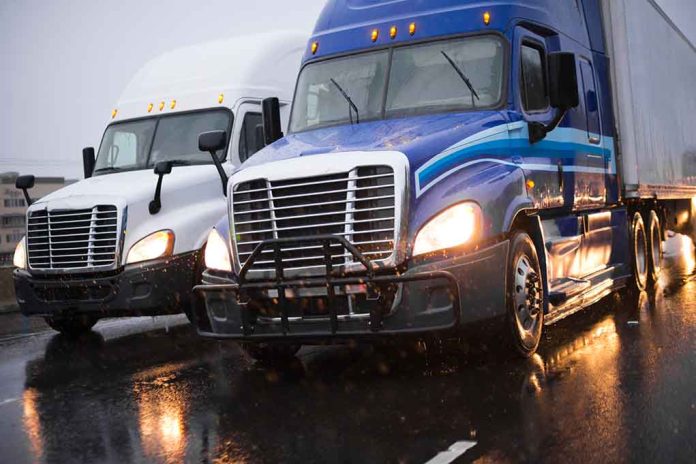
A hydrogen-powered truck shatters world records, traveling an astounding 1,806 miles on a single fill, challenging the dominance of diesel in heavy-duty transportation.
At a Glance
- The H2Rescue prototype truck set a world record by traveling 1,806 miles on one hydrogen fill
- The 33,000-pound vehicle is designed for emergency response and produces zero emissions
- The achievement demonstrates hydrogen’s potential as a viable alternative to diesel for heavy-duty vehicles
- The record was officially verified by a Guinness World Records adjudicator
Record-Breaking Journey Showcases Hydrogen’s Potential
In a groundbreaking demonstration of hydrogen fuel cell technology, the H2Rescue prototype truck has set a new world record by traveling an impressive 1,806 miles on a single fill of hydrogen. This achievement, verified by a Guinness World Records adjudicator, marks a significant milestone in the pursuit of sustainable transportation solutions for heavy-duty vehicles.
The record-breaking journey took place in Central California, with the 33,000-pound truck navigating public roads at speeds of 50-55 mph. Powered by a 250-kilowatt traction motor and consuming 168 kilograms of hydrogen, the H2Rescue prototype showcased the impressive range and performance capabilities of hydrogen fuel cell technology.
At 1,806 miles, @AcceleraZero officially holds the Guinness World Records title for the longest drive of a fuel cell heavy-duty truck on a single fill of hydrogen! 🏅
Thank you to the partners who helped make the H2Rescue demonstration vehicle possible: DHS Science and… pic.twitter.com/bdW2awncHy
— Accelera by Cummins (@AcceleraZero) October 29, 2024
Collaborative Effort Yields Remarkable Results
The H2Rescue project is the result of a collaboration between Accelera, a division of Cummins, and several government agencies including the Department of Homeland Security, the Department of Energy, and the Department of Defense. This partnership highlights the growing interest in hydrogen technology across both public and private sectors.
“This world record is a triumph for interagency collaboration and proof that hydrogen is a viable alternative fuel for vehicles,” said Nicholas Josefik, an engineer at the U.S. Army Engineer Research and Development Center. “By using hydrogen, we can improve our Nation’s energy security and reliability.”
The success of the H2Rescue prototype demonstrates the potential for hydrogen fuel cell technology to revolutionize the heavy-duty trucking industry, offering a cleaner alternative to traditional diesel-powered vehicles.
Environmental Benefits and Future Implications
One of the most significant advantages of the H2Rescue prototype is its environmental impact. Throughout its 1,806-mile journey, the truck produced zero emissions, in stark contrast to a comparable diesel vehicle which would have emitted 664 pounds of pollution over the same distance.
“Together with our Government partners, we’ve achieved a key milestone in demonstrating long-haul, zero-emissions transportation,” stated Prateek Vaish, the Technical lead on the project.
The potential impact of widespread adoption of hydrogen fuel cell technology in the trucking industry is substantial. Annually, a fuel-cell truck could save over 1,800 gallons of fuel and cut carbon pollution by 2.5 million tons, contributing significantly to efforts to combat climate change and reduce dependence on fossil fuels.
Challenges and Future Developments
While the H2Rescue prototype’s achievement is undoubtedly impressive, challenges remain in the widespread adoption of hydrogen fuel cell technology. These include the current lack of hydrogen refueling infrastructure and the need to develop more sustainable methods of hydrogen production.
The success of the H2Rescue prototype serves as a powerful demonstration of the capabilities of hydrogen fuel cell technology and sets a new benchmark for sustainable, long-range transportation solutions. As research and development in this field continue, we may soon see hydrogen-powered vehicles becoming an increasingly common sight on our roads, contributing to a cleaner, more sustainable future for all.









